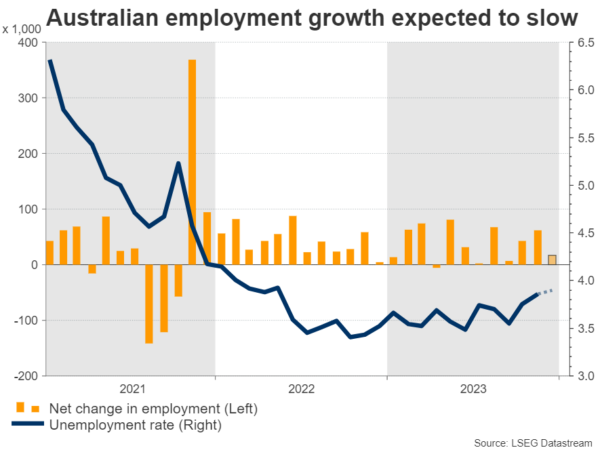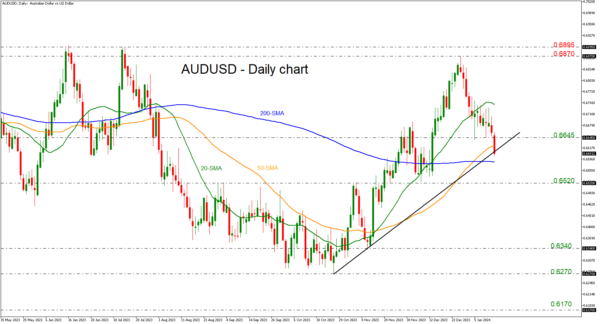- Australia to add fewer jobs than before
- Unemployment rate to remain unchanged
- Aussie plummets ahead of the release on Thursday at 00:30 GMT
Data on employment continues to be relatively reliable. In most months, the increase in the labor force is bigger than the rise in unemployment. This is helping to keep the unemployment rate under control, which is currently relatively low at 3.9% but is nevertheless increasing. Even though retail sales have fallen by approximately 2% y/y, they appear to be rather stable and do not indicate any signs of recession or household concern. Despite the Reserve Bank of Australia’s (RBA) tightening, housing the single largest source of household wealth appears to be in good shape.
RBA to cut rates in 2024
As most people expected, the Reserve Bank of Australia kept its cash rates at 4.35% at its last meeting of the year. Last month, Bullock warned that inflation was being caused more and more by high demand at home rather than supply changes from other countries. The board said it was aware that getting inflation back to the goal range of 2 to 3% was taking longer than expected. They also said that real inflation was higher than expected because the cost of services was going up faster than expected. Policymakers said again that more tightening will depend on the facts and how the risks are seen. The committee also said it would keep a close eye on the global economy, changes in local demand, and the future of inflation and the job market.
Concerns around the cost-of-living and interest rates continue to dominate consumers’ worries. The RBA’s decision to leave policy unchanged in the month provided little comfort, as household incomes remain under intense pressure from elevated inflation, sharply higher interest rates and a rising tax take.
As far as the market pricing is concerned, futures markets are pricing in a 50% likelihood of a reduction in May. By August, the first increase will be entirely priced in, and by December, a subsequent 25bps reduction is fully factored in by the market.
Employment report in the spotlight
The job market did better than expected in November, adding 61.5k jobs. It has now added 110k jobs over the last three months. This week’s news on job openings backs up the idea that the need for workers will remain strong for a while. Even though companies are still able to handle a lot of the extra workers, there are signs that the job market is becoming less tight for those who already have jobs.
The market expects the number of jobs to go up by 18,000 in December and the jobless rate to stay the same at 3.9%. The rate of participation is also likely to stay the same at 67.2%.

AUDUSD in sell-off mode
This week, the latest Australian labor force report, which is set to come out on Thursday, will also have an impact on how the AUDUSD moves. Currently, the market is plunging near the medium-term ascending trend line around the 0.6600 round number and any drops lower would open the way for a bear market until the 200-day simple moving average at 0.6580. Even lower, the market may challenge the 0.6520 support level.
On the other hand, a rise beyond the 0.6645 barrier could take the price until the 20-day SMA at 0.6740 ahead of the 0.6870-0.6895 restrictive region.










